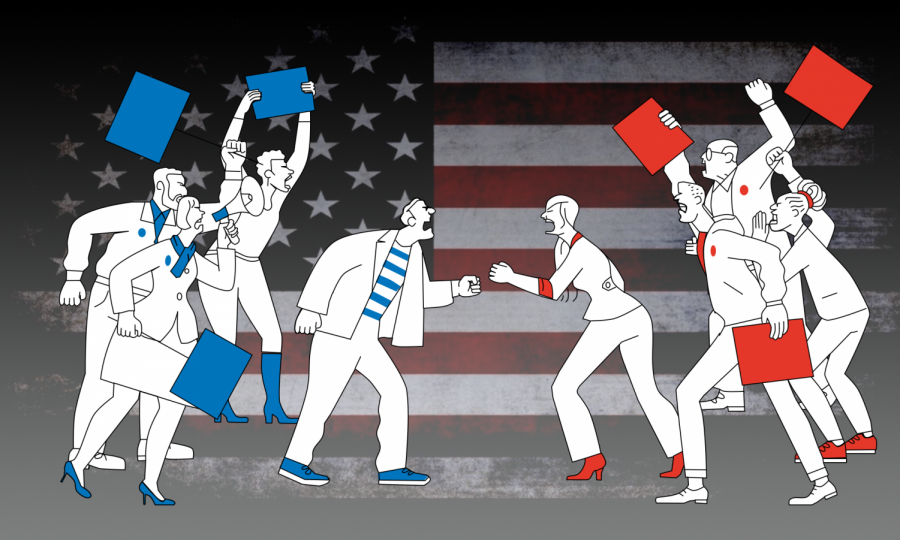In the landscape of American politics, there exists a deep-seated division that cuts through the heart of the nation: political polarization and partisanship. Over the past several decades, this divide has grown increasingly pronounced, reshaping not only the way people engage with politics but also the very fabric of American society. From Capitol Hill to dinner table discussions, the rift between ideological camps has widened, fostering an environment marked by distrust, animosity, and gridlock. Understanding the roots, manifestations, and consequences of this polarization is essential for navigating the complex terrain of contemporary American politics.
Table of Contents
The Roots of Polarization
The seeds of political polarization in America can be traced back to various socio-political, economic, and cultural factors. Historically, the United States has witnessed periods of intense ideological conflict, such as the Civil War and the civil rights movement. However, the current polarization is distinct in its persistence and pervasiveness.
One significant factor contributing to polarization is the rise of partisan media and echo chambers. With the advent of cable news networks, social media platforms, and online news outlets, individuals can now tailor their information consumption to align with their preexisting beliefs. This phenomenon, known as “confirmation bias,” reinforces partisan identities and exacerbates ideological divides.
Additionally, demographic shifts and geographic sorting have played a role in polarization. Americans are increasingly self-segregating based on political preferences, leading to homogenous communities where individuals are less exposed to diverse viewpoints. This spatial polarization further entrenches partisan allegiances and diminishes opportunities for constructive dialogue.
Manifestations of Partisanship
The polarization of American politics is evident across various domains, from legislative gridlock to public opinion and electoral behavior. In Congress, partisan polarization has reached unprecedented levels, with lawmakers prioritizing party loyalty over bipartisan cooperation. The proliferation of filibusters, government shutdowns, and hyper-partisan rhetoric has hindered legislative productivity and eroded public trust in government institutions.
At the grassroots level, political polarization is reflected in the electorate’s attitudes and behaviors. Studies have shown a growing ideological divergence between Democrats and Republicans, with each side viewing the other with increasing suspicion and hostility. This polarization is particularly salient during election cycles, where voters are deeply entrenched in their respective ideological camps, leading to highly competitive and contentious campaigns.
Furthermore, issues once considered non-partisan, such as climate change and healthcare, have become politicized battlegrounds, further deepening the partisan divide. The inability to find common ground on these critical issues not only impedes policymaking but also exacerbates societal divisions and undermines democratic governance.

Consequences for American Democracy
The consequences of political polarization and partisanship extend far beyond the realm of politics, permeating society and threatening the foundations of American democracy. One of the most concerning implications is the erosion of trust in democratic institutions. When partisan loyalties supersede commitment to democratic norms and principles, the legitimacy of elections, the judiciary, and the rule of law comes into question.
Moreover, political polarization fuels social fragmentation and cultural animosity, fostering an “us versus them” mentality that undermines social cohesion and mutual respect. This toxic atmosphere not only stifles meaningful dialogue but also contributes to social unrest and polarization-induced violence, as witnessed in incidents like the Capitol riot of January 6, 2021.
Economically, polarization hampers policy effectiveness and undermines efforts to address pressing issues such as income inequality, infrastructure development, and fiscal responsibility. The inability of lawmakers to compromise and enact bipartisan solutions exacerbates economic disparities and impedes long-term economic growth and stability.
Also Read: The Debate Over Student Loan Forgiveness America
Navigating a Divided Nation
Addressing political polarization and partisanship in America requires a multi-faceted approach that addresses both structural and cultural factors. Efforts to promote media literacy and critical thinking skills can help individuals navigate echo chambers and engage with diverse perspectives more effectively. Encouraging dialogue and collaboration across ideological lines is essential for bridging divides and fostering a sense of national unity.
Furthermore, electoral reforms aimed at reducing the influence of money in politics and promoting electoral competition can mitigate the polarization-inducing effects of gerrymandering and special interest groups. Emphasizing civics education in schools can equip future generations with the knowledge and skills necessary to participate in a vibrant and inclusive democracy.
Ultimately, overcoming political polarization and partisanship requires a collective commitment to the principles of tolerance, empathy, and compromise. By transcending narrow partisan interests and embracing the common good, Americans can build a more resilient and inclusive democracy that reflects the rich diversity of perspectives and experiences within the nation.
Conclusion.
Political polarization and partisanship pose significant challenges to the health and stability of American democracy. Rooted in socio-political, economic, and cultural factors, this divide has profound implications for governance, social cohesion, and democratic legitimacy. By acknowledging the roots and manifestations of polarization and embracing strategies to promote dialogue, collaboration, and civic engagement, Americans can work towards a more united and resilient democracy that honors the pluralistic ideals upon which the nation was founded.


Leave a Comment